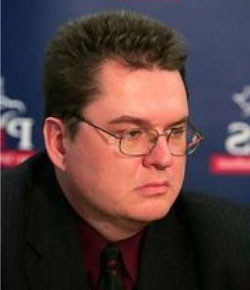Andrei Pachobut: ‘The authorities use the police and the KGB to make people refuse from membership in the Union of Poles. They are testing the reaction of the West.’
In November the EU will consider the issue on re-imposing the sanctions against the Belarusian authorities. One of the conditions put to the official Minsk by the international community is securing the rights and freedoms of the Belarusian citizens belonging to national minorities. This condition was introduced on the initiative of Poland and is a result of the complicated situation around the Union of Poles in Belarus, headed by Anzhalika Borys.
Andrei Pachobut, head of the main council of the Union of Poland in disgrace, journalist, correspondent of the Polish daily Gazeta Wyborcza, agreed to answer our questions.
-Andrei, do you see any changes in the situation of your Union of Poles on the eve of the EU decision on re-imposing the sanctions?
- The situation of the Union of Poles hasn’t changed. If we speak about the periodization of the attitude of the Belarusian authorities to the Polish national minority, it’s worth noting a very critical phase in 2005-2006. People were arrested and Polish houses were seized by the riot police who took away our activists and put there representatives of the pro-governmental Union of Poles, the people who agreed to collaborate with the Belarusian authorities.
Later, in 2007 there was another situation: the Belarusian authorities knew that the independent Union of Poles continued existing as an unregistered organization and supposedly agreed to it. Meanwhile, when Lukashenka’s dialogue with the West started, there were some concessions in the sphere of political rights – release of the political prisoners, return of two newspapers to the distribution net monopolized by the state. This liberalization didn’t concern the Union of Poles in any way.
This year, during the 7th assembly of our Union there was a very brutal wave of pressurization, comparable to 2005. People were summonsed to the ideological departments of executive committees and KGB offices. Those who were heading for the assembly were detained by the police. There weren’t any arrests of the leaders, as there were many journalists and TV cameras at the assembly and the authorities didn’t dare to disperse or hinder it. Another surge occurred in September, during the assembly of the pro-governmental Union of Poles. On its eve the authorities pressurized members of our organization with the aim to make them participate in the assembly. Such facts were registered and the Polish side was informed about them. We hoped that after two such peak events as these assemblies the situation would return to the state of virtual quietness, like it used to be in 2007. Pitifully enough, this didn’t happen.
- What is happening now?
- At present we observe a severe pressurization of members of our Union in Ivianiets. The authorities are testing the reaction of the West on the events. They are trying to appropriate the Polish House owned by the Union of Poles. However, they cannot take the riot police there to take our people out and their ones in (in 2005-2006 the police kept duty at the office of the Union of Poles in Hrodna guarding the pro-governmental administration). They cannot apply open repressions now. Nevertheless, they pressurize us through KGB, the police and the State Control Committee trying to influence our activists. A number of check-ups on anonymous letters concerning alleged violations of the financial discipline are being held. These check-ups are used to make the people refuse from participation in our Union or joining the pro-governmental one.
Bear in mind that our organization has always been non-political. Most of our activists are villagers and have never wanted to deal with politics. There were even those who voted for Lukashenka and it was a real shock for them that the Belarusian authorities so radically attacked the organization without any reasons – just because some officials had phobias.
- What problems do the Belarusian Poles mainly face with?
- The main problem is the education in the Polish language. The decrease of interest to learning Polish has been observed in schools and other state educational establishments for a long time already. The authorities explain it with the absence of the public interest. In fact, there are cases when people file applications for letting their children learn the Polish language as a school subject. The authorities don’t provide such opportunity and reduce it all to extracurricular classes once a week. Of course, the level of the knowledge received as a result of such study is minimal. For instance, in the beginning of this year such situation could be observed in Indura, a small village not far from Hrodna. There were 12 such applications there. The school administration talked with the parents and said that the education would take place at the expense of the Russian language, which is quite bad as there are no perspectives, etc. Only six applications were left after this talk. They were ignored. As a result the study of the Polish language was introduced as an extracurriculum classes. There are many such cases on the territory of Belarus, especially in Hrodna oblast.
On the other hand, the arguments of the Belarusian authorities about the absence of interest to learning the Polish language can be disproved by the fact that during the recent years one could observe the growth of the demand for the Polish language classes in the commercial educational establishments. We see youth and older people come to commercial courses, showing their readiness to pay money for learning Polish. It is evident that the Belarusian authorities are not interested in giving the Poles who are citizens of the Republic of Belarus the opportunity to learn their mother-tongue, and are trying to restrict their rights in this respect.
Moreover, the Union of Poles is the largest Polish organization in Belarus and its illegal status considerably limits the cultural rights of the Belarusian Poles and the right to distribute information in mother-tongue. Our editions Magazyn Polski and Glos znad Niemna are illegal and are distributed illegally. When the police come across our magazine, it is always confiscated. We consider it as the main problem of the Polish majority in Belarus.
- What is your personal position concerning the sanctions against the Belarusian authorities?
- The situation in Belarus is quite complex. One can see that the Belarusian authorities start counting with anyone only if they face a stark position. If the formulations are blurred, they readily promise anything, but never keep the promises. That’s why I think one needs to have a principled position towards the Belarusian authorities. It doesn’t mean that there shouldn’t be any talks. But only strong policy, based on certain values towards Aliaksandr Lukashenka can bring real results.



















